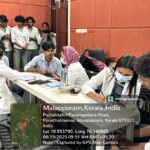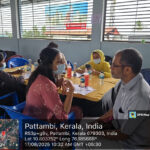INSTITUTIONAL DISTINCTIVE
INSTITUTIONAL DISTINCTIVENESS
MES Dental College had so far out stood in seeking up to the minute modalities to impart better knowledge and skill to our students. We have recently introduced a program for the students undergoing their rotatory internship, entitled IVAP (Internship Value Added Program).
IVAP is a part of the internship which include courses that are designed to provide interns with necessary employable and life skills in order to increase their employ-ability/self-employable opportunities and provide them with transferable skills to succeed in their career and life
As we all know that over the last few years the ongoing pandemic protocols have restricted the opportunities for our budding dentists to get exposed to various clinical challenges they are to face hereafter. Taking this into consideration the IVAP aims at giving the interns an absolute course of awareness and training to help them face the day to day challenges in the life of a dentist.
This is basically a one-year course along with the period of their rotatory internship. This include
Classes are conducted in the morning hours between 9:00 to 10:00 am.
OBJECTIVES:
The IVAP focus on developing following skills in the participant:
1. PROBLEM SOLVING SKILLS:
Help participant identify what is causing the problem and find a way to implement a solution. Helps participants to identify hurdles or inefficiencies in a process or procedure or communication.
2. ANALYTICAL REASONING:
This is a way related to problem solving skills; breaking down a larger problem into smaller ones to identify a solution.
3. CRITICAL THINKING:
Just believing something at face value is not acceptable. Looking at evidences and evaluating it to help decide if the information is more opinion /judgement than fact before using it to back up a decision.
4. LEADERSHIP SKILLS:
Includes the ability to take the lead on a project and get a team to follow through and accomplish shared goals. Leadership includes many additional transferable skills like communication, problem-solving and relationship building.
5. TEAMWORK:
Working together as a team to achieve a common goal. But being on the team and part of the team are different. They want team players, people who make positive contributions to the group to help in succeed.
6. LISTENING SKILLS:
Specifically, active listening skills is important when it comes to patient management. To solve patient’s problem or resolve a conflict you have to be able to listen and understand what the other side is saying.
7. CREATIVITY:
Creativity is not always related to arts it is about how you approach tasks and solve problems. Creative thinkers use novel solutions to the problems they face.
8. ATTENTION TO DETAIL:
Paying attention to even the finer details to make sure the best outcome
9. RELATIONSHIP:
They are often the building block of any organization.
10. COMPUTER SKILLS:
It’s good to know your way around the many software programs that businesses used today.
11. MANAGEMENT:
Management enables you to make sure that people are where they need to be and they are completing their tasks effectively.
OVERVIEW:
This program is a set of courses wherein the participants are awarded grade points in each course attended. Based on the grade earned a grade certificate shall be issued to the student at the end of the program. The courses include are:
A. COMPULSORY FOUNDATION:
1. Ethical issues
2. Patient management and communication
3. Public relation issues.
4. Emergency care of patients
5. Medico legal issues
6. Public health
7. Sterilization and disinfection
B. ELECTIVE FOUNDATION:
1. Financial management and budgeting
2. Career in research, bioethics, and research methodology.
3. Dental equipment
4. Counselling
C. ASSESSMENT:
Assessment is an integral part of an education system to identify and certify the academic standards accomplished by a student. Types of assessment included in the program are:
1. Self-assessment
2. Assignments
3. Computerized exams – consist of 50 multiple choice, matching and google forms
4. Projects – patient education video making, poster making.
5. Reflection essays – about case studies
6. Research papers – on particular topics within the student’s field
7. Group discussions
8. Peer assessment




